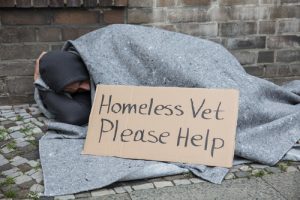
U.S. House Minority Leader Kevin McCarthy (R-CA) recently proposed a bipartisan bill that would make certain enhancements to grants and agreements between the U.S. Secretary of Veterans Affairs (VA) and entities that provide services to America’s homeless military veterans.
“Helping our homeless veterans get back on track by ensuring they have ample access to housing vouchers and other supportive services is an important step toward repaying our gratitude for their sacrifices and service to country,” Rep. McCarthy said.
The leader on Sept. 16 sponsored the Reducing Veteran Homelessness Act of 2020, H.R. 8275, with lead cosponsor U.S. Rep. Mike Levin (D-CA) to ensure the nation’s homeless veterans receive HUD-VA Supportive Housing (HUD-VASH) program vouchers and supportive services.
“I thank Congressman Levin for joining me on this bill and for his dedication to this very important cause,” said Rep. McCarthy.
If enacted, H.R. 8275 would require three steps to ensure that homeless veterans receive housing vouchers and supportive services: 1.) Require the VA to contract out vacant HUD-VASH caseworker positions to local, qualified community providers; 2.) Increase the per diem payments that community participants in the Grant and Per Diem (GPD) program may receive for each homeless veteran that they house; and 3.) Allow GPD program community participants to use GPD funds to gain access to their local Homeless Management Information System.
“For generations, our veterans have sacrificed immensely to guarantee the safety of the United States at home and abroad,” Rep. McCarthy said. “Because of their service, our country remains a world leader and beacon of hope across the globe. When our service members leave the military, it is our responsibility to help them in their transition to civilian life, especially for those who fall on hard times.”
The California Veterans Assistance Foundation Inc. and the National Coalition for Homeless Veterans support the legislation, referred to both the U.S. House Veterans’ Affairs Committee and the U.S. House Financial Services Committee for consideration.



